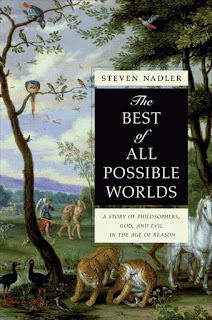Gottfried Wilhelm Leibniz - one of the most brilliant minds of all time - a true polymath...contributor to logic, mathematics, history, linguistics, ethics, politics, law, philosophy, theology and natural
science...
the principle of sufficient reason - everything that exists must have a reason for existing or a cause for its being ...
plenitude - that the existing universe must necessarily actualize all possible (i.e. viable) forms of existence...
monads - simple substances, immaterial and indivisible, without parts, akin to spiritualized atoms or atomic "souls"...
pre-established harmony - the harmony or pre-established order that regulates causal interactions between substances within Nature...
identity of indiscernibles - the principle that no two numerically distinct entities can possess absolutely identical properties - which perhaps means that there are no absolute clones or doppelgangers...
middle knowledge - the idea that God has foreknowledge of everything in the sense of having knowledge of all contingent possibilities of what can and will occur...i.e. knowing everything that can happen without compelling everything to happen in a particular manner...
necessary being - a.k.a. the complete notion or the complete concept of individuals - the idea that for any given entity, all possible predicates that pertain to individual X are included in the subject, "X" - i.e. all actions, relations or events involving individual X are contained within the ontological concept of X...
intelligent souls - minds, unlike other substances in nature, are self-aware, able to reflect on themselves in relation to other entities...
the principle of continuity - the idea that "nothing [ever] happens suddenly"...or that "Nature never takes leaps"...the process of change always includes an infinity of intermediary steps....
...As Leibniz writes: "the rules of the finite also succeed for the infinite..."
little perceptions - infinite, composite, unconscious perceptions that help to "mirror" or "instantiate" the reality of the [surrounding] world within our own minds...
possible worlds or the principle of the best - the notion God is compelled by reason to choose the optimum scenario out of a set of lesser alternatives - thus making 'this' (i.e. the cosmos in aggregate) the "best of all possible worlds"...



